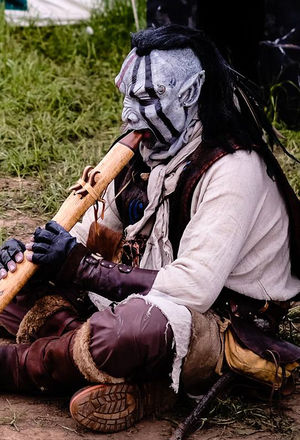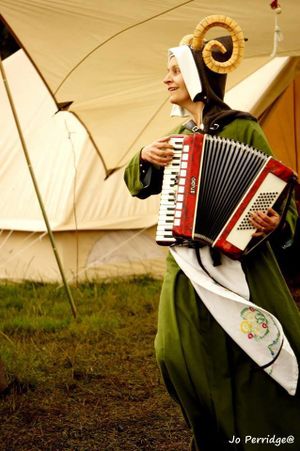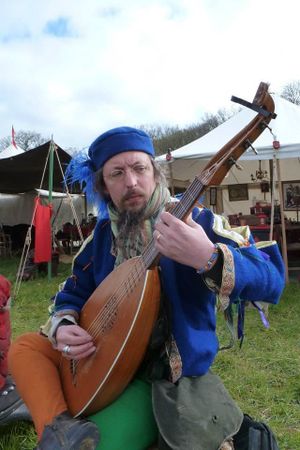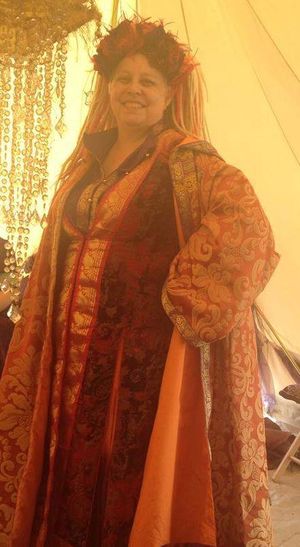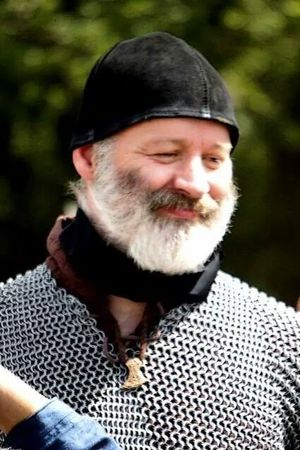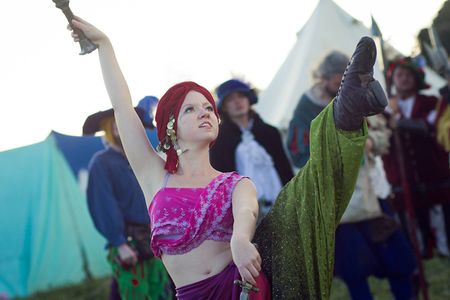The Three Refrains
No edit summary |
|||
| Line 40: | Line 40: | ||
Comes from the Siroc Plains of Madruga and until the collapse of her husband’s business enjoyed a privileged life. As a lady of some means she had opportunity to study some of the more formal and traditional songs of the Brass Coast, but that has not prevented her from picking up songs and interesting music from traders who frequent the Madrugan docks. Her overriding passion, as befits one of Brass Coast origins, is to encourage music in others and it is a joy to her when the most reticent of performers blossoms or when the most curmudgeonly music-hater begins to tap his feet. As night falls and drink begins to flow, Zuleikha has a tendency to revert to the shanties, drinking songs and dance tunes of the Siroc dockside and the loading stages on the Scorerro River. It was on such an occasion she first ran into Stone. She may remember less about that first encounter than she would care to admit, but that songs were traded, hearts and voices were high, glasses were full and dances were wild – of that she is absolutely certain | Comes from the Siroc Plains of Madruga and until the collapse of her husband’s business enjoyed a privileged life. As a lady of some means she had opportunity to study some of the more formal and traditional songs of the Brass Coast, but that has not prevented her from picking up songs and interesting music from traders who frequent the Madrugan docks. Her overriding passion, as befits one of Brass Coast origins, is to encourage music in others and it is a joy to her when the most reticent of performers blossoms or when the most curmudgeonly music-hater begins to tap his feet. As night falls and drink begins to flow, Zuleikha has a tendency to revert to the shanties, drinking songs and dance tunes of the Siroc dockside and the loading stages on the Scorerro River. It was on such an occasion she first ran into Stone. She may remember less about that first encounter than she would care to admit, but that songs were traded, hearts and voices were high, glasses were full and dances were wild – of that she is absolutely certain | ||
{{CaptionedImage|file=Tony_Taylor_Wintermark_Bard.jpg|align=left|caption=Tiny Dunning|width=300}} | {{CaptionedImage|file=Tony_Taylor_Wintermark_Bard.jpg|align=left|caption=Tiny Dunning|width=300}} | ||
===Salvatorri Galletti di Sarvos=== | ===Salvatorri Galletti di Sarvos=== | ||
| Line 52: | Line 50: | ||
{{CaptionedImage|file=Maritza.jpg|align=right|caption=Maritza i Ruiloba i Guerra|width=450}} | {{CaptionedImage|file=Maritza.jpg|align=right|caption=Maritza i Ruiloba i Guerra|width=450}} | ||
Better known as the Brass Coast Dagger Dancer, she was born into a large performing family and has dedicated her life to dance. She spends her time training and studying the dances of each of the ten nations. Her goal is to discover and teach the traditional styles for every nation. If you wish to see her dance, you better have something worthy of her attention to offer. If you want to learn to dance, however, the fee is much more modest. She is even available to create dances for you or your group | Better known as the Brass Coast Dagger Dancer, she was born into a large performing family and has dedicated her life to dance. She spends her time training and studying the dances of each of the ten nations. Her goal is to discover and teach the traditional styles for every nation. If you wish to see her dance, you better have something worthy of her attention to offer. If you want to learn to dance, however, the fee is much more modest. She is even available to create dances for you or your group | ||
===Bloodcrow Stone=== | |||
Stone is a very old Orc, who was fully grown when the rebellion occurred. He took part in many of the battles and fought alongside Thrace, and continued to fight until the treaty was made with Ahraz. After spending much of his more youthful days fighting alongside the legions, Stone began to hear the voices of the ancestors more clearly, and took to wandering the land of the Empire to find the place where the voices could be heard the best. In his journeys, he heard many stories and songs from all of the nations of the Empire and determined to keep his voice and that of the orcs alive through story and song. After hearing the story of the Emperor Nicovar he realized that all nations should do the same in order to retain their history, and so he sought out knowledgeable bards to recreate the sodality known as the Three Refrains. | |||
[[Category:The Empire]] | [[Category:The Empire]] | ||
[[Category: Sodality]] | [[Category: Sodality]] | ||
Revision as of 11:33, 17 March 2016
Overview
The Three Refrains is an old bardic sodality whose prominence has waxed and waned over the years. The group is based on a founding set of principles, the Three Refrains, from which it takes its name. Sworn to political neutrality, they are committed to an ethic of service, dedicated to aiding the people of the Empire. Bards have a traditional role in the Empire preserving important lore as well as music, poetry and dance of their nation, but members of the sodality are known for their interest in helping any citizen of the Empire regardless of nation. This has led people to assume that the sodality exists to spread knowledge, though in practice members prefer to focus on helping citizens find the knowledge they are seeking, rather than simply passing it on.
The Refrains
The Founders' Refrain expresses an ideal to preserve the rich cultural identity of each nation of the Empire. Despite the political neutrality of the sodality, members of the Three Refrains are often found in the company of egregores - with whom they share this common concern. The founders of the sodality believed it was important to maintain the distinct character of the artistic and musical traditions of the nations. They were happy for music to be shared - but wanted to ensure that each nation retained its own unique musical tradition - that each people remained conscious of which music, which songs, which dances were their own.
The Bards' Refrain aims to encourage musical performance, song and dance, a principle the sodality shares with bards across the Empire. In a land obsessed with politics and war, the claim is that bards are best placed to remind people of their essential humanity, encouraging them to take joy in their lives. The sodality see it as particularly important that there is music in every nation camp at Anvil during the summit, either by performing there themselves or more usually by working with bards and performers of the nation to encourage to encourage celebration and song.
The Heroes' Refrain is the most famous of the sodality's goals - to help the people of the Empire become heroes - to see them achieve great deeds and immortalize those actions for future generations. The most practical implication of this lofty aspiration is to help citizens who are seeking to achieve great deeds by providing them with encouragement and support. This is usually in the form of esoteric lore - for the sodality maintains a strong oral tradition of lore and will usually share this freely if they believe it will help the listener on the path to greatness. Members of the sodality will usually help people who are on a specific or in pursuit of a specific goal - but they have also been known to help those who have not yet found the path that will take them to glory. The sodality ultimately draws its roots from the Dawnish traditions of the Tests and members often have good links with the Earls of Dawn - working with them to help set challenging tests.
History
The first members of the Three Refrains were a group of five Dawnish troubadours who sought their own solution to the chaos and anarchy that followed Nicovar's madness. While the Senate bickered over the costs involved in attempting to rebuild the destroyed libraries, the minstrels claimed that Nicovar had done the Empire a favour. Under his rule, the Empire had become a thing of books and study, they had piled up great store houses of knowledge, but they had neglected to use the information they treasured. In searching to take the measure all things, to assess its worth and value they had lost the passion for life. They sought to create a Dawnish institution that would not just inspire nobles and yeomen alike to acts of greatness but would arm them with the knowledge they needed to achieve it.
The troubadours were popular with those they helped, but their habit of giving aid only where they felt it was warranted did not endear them to everyone. Powerful figures from Dawn and beyond sought them out, thinking that the troubadours might provide them with answers to troubling questions, but the group had little time for senators, generals, cardinals, grandmasters or archmages and even less for the politics of Anvil. After a very public spat with a prominent Dawnish earl, the Senator for Weirwater, in which they refused to give her the name of a herald who was troubling fisherman of the shores of Sandling, they swore an oath of neutrality - forgoing any involvement in the politics of the Empire in favour of helping the common citizens of every nation achieve glory.
The oath of neutrality was the true foundation of the sodality - as the troubadours tale slowly spread, it touched a chord with other kindred spirits. Bards from other nations sought them out. The first three were a Wintermark scop, a Highborn archivist and a Freeborn sutannir. Together they formulated the principles of their sodality - describing them as the three refrains. Over time they built up a network of friends and allies, bards and learned men and women in every nation who, even if they were not members of the group, were prepared to share information with them on the understanding that such lore would ultimately be used to help the Empire.
In the years since, the membership of the sodality has waxed and waned. At times it has ceased to exist altogether, only to be reborn again later when another bard discovers the tale and decides to take up the mantle.
In the chaos of recent times, following the death of Britta and her followers, the Three Refrains has been reformed under the leadership of an orc bard called Stone. He has gathered a handful of bards to his cause and together they hope to restore the reputation and accomplishments of the sodality. Staying true to their roots, the members of the sodality have eschewed any involvement with the politics of the Empire, swearing an oath to take no office and serve no title. Instead, they plan to travel the Empire, encouraging music and performance and dispensing lore to those they believe will use it to achieve greatness.
In Play
Most members of the sodality are NPCs who are part of our player support team. They work alongside the egregores encouraging people to perform music and entertainment in the appropriate style for each nation. But rather than having a focus on their own nation - members of the sodality work with bards and performers from every nation. We want to encourage each nation to strive to maintain its own unique musical style, but characters of every nation can perform and enjoy any songs that are appropriate to the Empire setting, not just their own.
In addition to this, members of the sodality will often try to help individual citizens who are seeking assistance with some challenging task or quest. If you are struggling to find a way to follow up a plot in the field at Anvil - if there is some great task you want to attempt but do not know how to get started - then a member of the sodality may help you. If they choose to help then will often consult with their fellow bards to ensure they provide the best possible assistance. One of the reasons that members of the sodality are NPCs, is so that they can consult with the plot team to provide aid that may be useful in game. Usually aid will be in the form of information or advice that will help you get started on your quest - but do not expect too much - the sodality's role in game is to encourage and enable players to achieve things in game - not to do it for you.
Do not automatically assume that members of the sodality will help you - they are characters and will need to be convinced to help you. In particular, the more important and powerful your character is, the less likely they are to have any interest in helping you. You should also expect to pay for any help you receive; their aid is not dear and the bards won't charge you if they can't help you but they will expect to be rewarded for their time and effort if they can help you.
Because they have sworn an oath of political neutrality, members can be trusted with any request for aid. Even if that bard will not help you, you know you will not find your plans leaked to a rival - or even a magistrate should your ambitions not be entirely legal.
If you are a talented performer who is an active participant in the political game of Empire, then membership of this sodality is not for you (all members swear binding oaths of neutrality). We hope you will still take time to get to know the members of the sodality - part of their remit is to work with players across the game to encourage music and performance in every camp. Our NPCs are briefed to encourage players who are performing and to give them what support they can. Just because you can't be a member of the sodality, hopefully you will find the members are staunch allies and sources of useful information and support for bards across the game.
Members
Kit the Mummer
Kit travels place to place, bringing news and gossip, plays (invariably magical in nature) and songs and always plenty of tunes to tap your foot to! She is most at home in the thick of a crowd, whether in taverns, round the maypole on the village green or a town square. The more people that are creatively involved in the spectacle, the better. Stone first came across her when he was nearly bowled over by a rowdy Marcher mob squeezing through a narrow Meade alleyway as part of their annual Wassail parade! If you want to find her, look for the horns bedecked in ribbons or seasonal leaves and flowers! She’ll be encouraging everyone to join in with a song or tune, invariably playing her accordion, fiddle or whatever instrument happens to be lying around. She might say she’s a Jack of all trades – you need many to be a mummer - whether improvising, harmonising, writing new plays and songs, working with people to turn their poetry into song or getting a good foot-tapping dance tune going.
Zuleikha i Mafaraxas i Guerra
Comes from the Siroc Plains of Madruga and until the collapse of her husband’s business enjoyed a privileged life. As a lady of some means she had opportunity to study some of the more formal and traditional songs of the Brass Coast, but that has not prevented her from picking up songs and interesting music from traders who frequent the Madrugan docks. Her overriding passion, as befits one of Brass Coast origins, is to encourage music in others and it is a joy to her when the most reticent of performers blossoms or when the most curmudgeonly music-hater begins to tap his feet. As night falls and drink begins to flow, Zuleikha has a tendency to revert to the shanties, drinking songs and dance tunes of the Siroc dockside and the loading stages on the Scorerro River. It was on such an occasion she first ran into Stone. She may remember less about that first encounter than she would care to admit, but that songs were traded, hearts and voices were high, glasses were full and dances were wild – of that she is absolutely certain
Salvatorri Galletti di Sarvos
Orphaned and homeless at an early age by the devastation of the Theatre dell'Anima during the tempest which struck Caricomare in 348YE, Salvatorri has spent his life in the streets and back alleys of the Empire’s cities and towns, plying his trade as a busker, mountebank and musician for hire.
Tiny Dunning
Bards in Wintermark (known as "scops") are responsible for giving "names" to people to mark significant events or achievements. Thus Bruin (pronounced "broon") Dunning is known universally as "Tiny". Indeed, if you ask for "Bruin", nobody will know who you mean. For many years, a wandering bard, going from hall to hall, and across other nations of the Empire, he frequently met with a certain softly spoken orc and the two became firm friends. Tiny returned to Wintermark to help his sister following the death of her husband. Spending so long amongst other peoples has shown him the importance of the diversity of the nations of the Empire, and of using their various strengths to support each other. Never keen on written history, when his friend Stone told him of the Dawnish troubadores of the past, and their Three Refrains, Tiny was instantly drawn to the idea and became a keen participant. If you seek his help, expect a tale, or a song, but not a document. Nor will he be waiting around for you to write his words down. If that is the sort of help you wish, perhaps you should seek out a librarian..
Maritza i Ruiloba i Guerra
Better known as the Brass Coast Dagger Dancer, she was born into a large performing family and has dedicated her life to dance. She spends her time training and studying the dances of each of the ten nations. Her goal is to discover and teach the traditional styles for every nation. If you wish to see her dance, you better have something worthy of her attention to offer. If you want to learn to dance, however, the fee is much more modest. She is even available to create dances for you or your group
Bloodcrow Stone
Stone is a very old Orc, who was fully grown when the rebellion occurred. He took part in many of the battles and fought alongside Thrace, and continued to fight until the treaty was made with Ahraz. After spending much of his more youthful days fighting alongside the legions, Stone began to hear the voices of the ancestors more clearly, and took to wandering the land of the Empire to find the place where the voices could be heard the best. In his journeys, he heard many stories and songs from all of the nations of the Empire and determined to keep his voice and that of the orcs alive through story and song. After hearing the story of the Emperor Nicovar he realized that all nations should do the same in order to retain their history, and so he sought out knowledgeable bards to recreate the sodality known as the Three Refrains.

